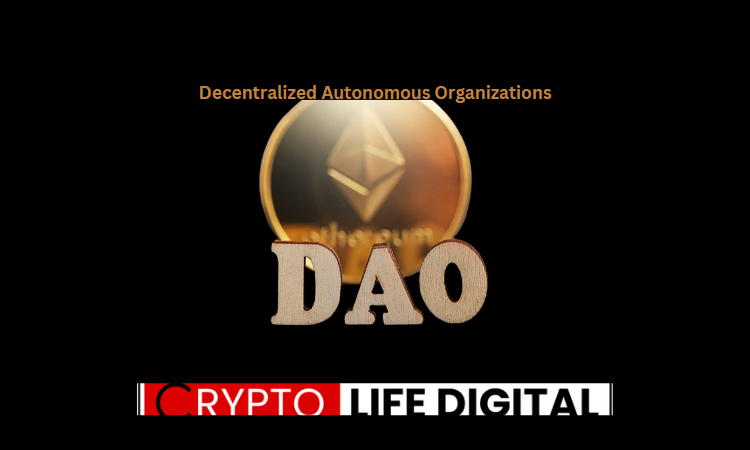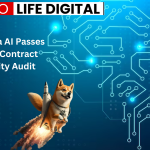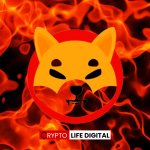DAO: Definition And overview

DAO is one of the terms used in the crypto world to refer to decentralized autonomous Organizations. It is important to get acquainted with all the terms in the digital world, this will help you not to fall victim to the financial crash.
The consistent growth in the blockchain space is incomplete without the introduction of new terminologies to accompany it, that is to say, the more improvement the digital world witnessed, the more new terminologies are coined.
we will delve into the explanation of the concept of DAO, for the purpose of this article.
The Concept Of DAO
A DAO or a Decentralized Autonomous Organization is a community-led entity with no central authority
that makes rules and decisions using smart contracts built on a blockchain network.
It is Decentralized because there is no central governing authority., and it is Autonomous because it is self-
governing or capable of making and implementing decisions once votes have been cast by the members
of the DAO- the token holders.
Read Also: All You Need To Know On Decentralized Finance (DeFi)
Brief Overview Of DAOs
Decentralized Autonomous Organizations share certain similarities with the regular firms we know.
Just like a shareholder doesn’t become one except they are committed financially (through investment) to that company, one becomes a member of a DAO by purchasing the native token of that DAO.
The token helps generate funds for the DAO and gives the holder the privilege of proposing/or voting on
decisions.
Much like the shareholders in organizations hold board meetings to make decisions concerning the firm which are then followed by the CEO, the token holders in a DAO vote using the native token of that DAO make decisions that are then implemented by the Smart contracts.
So in DAOs, they are not CEOs! These decisions can be anything from making a pay raise, hiring employees, adjusting transaction fees to undergoing a proposed project, etc.
This decision-making process is very transparent because the vote is posted on a blockchain network.
Decentralized Autonomous Organizations (DOAs) have experienced a dramatic increase in adoption rate in recent years, thanks to blockchain technology and the growing number of people in the Crypto space.
How DAOs Operate
The operation of DAOs is largely dependent on smart contracts- programs stored on a blockchain that
run when certain predetermined conditions are met.
So depending on the outcome of the voting process, certain code gets implemented to effect the change agreed upon.
As stated earlier, the decision-making power is conferred on members by virtue of their possession of the DAOs native token, this also means that the more the token a particular token holder has, the higher the voting power of that individual.
For example, a user holding 50 native tokens of the DAO will have about three times more voting power than another user with just 13 tokens in possession.
You may be concerned, what if a whale (user with a reasonable percentage of the DAOs tokens) chooses to make a bad move?
Since they have a greater weight of voting power, things are more likely to go their way. Well, you are right, but consider it this way, that will be like a shareholder holding a good percentage of a company’s stock choosing to make a wrong move, that user will be risking more than any other shareholder.
The same is the case in DAOs, a token holder with a reasonable percentage of the DAOs token will have more to lose in such a circumstance and therefore will moderate their actions.
Read Also: Advantages Of Tokenization
Benefit Of DAOs
- Decentralized Nature
A DAO is essentially an entity without any central authority. This decentralized character of DAOs encourages community participation amongst the diverse users that make up the DAO, this is likely to prevent stereotyped decisions.
- Trustless Nature and higher participation
Trustless in this case means you do not get to entrust the entire decision-making process to a certain authority, leader, manager, or CEO.
The decentralized nature of DAOs and their use of Smart contracts make them very transparent and therefore very trustless.
- Open-source nature and high reliability
DAOs generally have their code out there for everyone to see and make improvements upon. This increases the reliability of the DAOs.
- Transparency
The fact that the whole decision-making process is posted on a blockchain makes it very transparent. The DOA can not be considered truly decentralized if the token holders cannot monitor their votes or could it.
Read Also: Roles Of Whales In The Cryptocurrency World
Downside Ti DAOs
1. Vulnerability to attack
The open-source nature of DAOs makes them very transparent and reliable. But this also predisposes them to attacks if attackers understand the technicality of their code.
2. Speed
Being that the members of the DAO have to vote on virtually every step, the process is made relatively slow in terms of speed and may prove inefficient in handling urgent matters that may come up.
However, many DAOs have developed preventive measures to curb this. Other cons of DAOs could include the fact that they enjoy very little privacy and thus can not keep business secrets due to their transparent nature.
Companies generally spend a lot to gain initiatives- business secrets that they hope will help the company in the future. However, DAOs do not enjoy this privilege.
Final Note
DAOs were originally developed to regulate blockchain protocols and decentralized Apps (dApps) but their people-oriented nature has made them very useful in other non-crypto spaces like trading, music, and gaming.
A great mind such as you may soon want to build a DAO, worth giving a thought right? Whatever the case, do check out my other article on the different varieties of DAOs and how to build your own DOA.
from scratch.
Follow us on Twitter, Facebook, Telegram, and Google News

Michael Onche: Crypto aficionado and seasoned analyst. With a keen eye for market trends and a passion for blockchain technology, he deciphers the intricacies of cryptocurrency with precision. Michael’s expertise and insightful content make him a trusted guide for navigating the dynamic world of digital assets.




